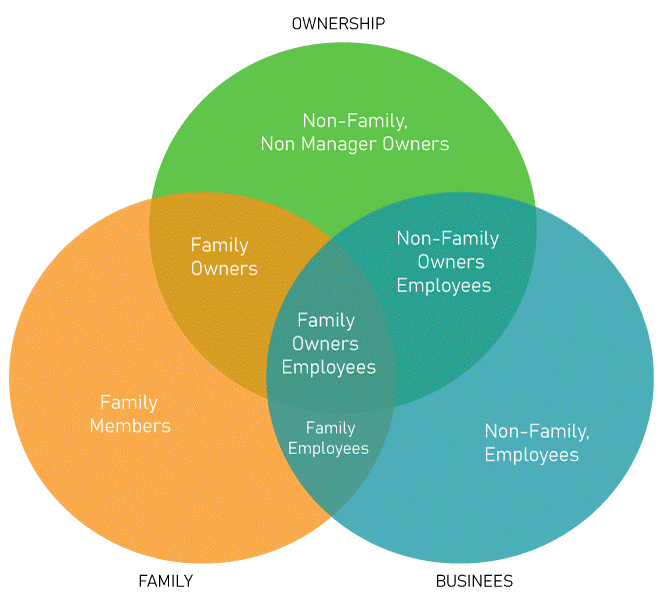Advantages and Disadvantages of Family BusinessThe oldest and most prevalent type of economic organization is the family business. A family business is actively owned, run, and managed by two or more members of a single family. Several generations of a family who are linked by blood, marriage, or adoption and who have the authority to affect the direction of the Business as well as the motive to do so to accomplish desired goals can influence decision-making in a family business. Since they have executive or ownership positions, they have a close relationship with the Business. 
Types of Family Business1. Family-Owned BusinessAs the name implies, a family-owned firm is one in which a family member or the family owns the majority of the ownership share . 2. Family-Owned and Managed BusinessA single-family or a single-family member typically controls the ownership of these types of businesses. With controlling ownership, the family can set its own goals and choose its strategies. 3. Family Owned and Led BusinessIn such a business, at least one family member sits on the board of directors and owns most of the company's stock. In this approach, the family member might impact the company's direction, tactics, and plans. Family Business CharacteristicsSome of the main elements and characteristics of family business are-
Structure of Family BusinessThe family business system's three-circle model is illustrated as follows: The first circle in this diagram represents "ownership," the second circle represents "family," and the third circle indicates "business ." We will now talk specifically about entity: 
Advantages of Family Business
1. Commitment Family businesses typically have a higher feeling of dedication and accountability than non-family firms since both the needs of the family and the Business are at stake. Greater awareness of the market, the organization, and the work, stronger customer relationships, and more effective sales and marketing are benefits of this desire for the family and Business to remain strong. 2. Stability Each family member's role in the family business typically determines its leadership. In many family-owned businesses, the executive will remain in place for several years before a change in leadership is brought about by personal circumstances like illness, retirement, or death. This ensures overall stability within a family-run organization because leadership tends to be stable throughout time. 3. Trust and Authenticity Trust is an essential component of all business organizations and is particularly strong in most prosperous family-owned and -run businesses. Because family members naturally trust one another, the company's leadership can speak, dispute, and do so more freely. Staff members and employees are given a freer space for authenticity, which can lead to innovative business ideas as the company's leadership practices a stronger sense of trust. Authenticity and a culture of trust may open the door for career advancement and the overall success of a company when used wisely. 4. Flexibility and Versatility Most frequently, the company's leadership, comprised of members of the same family or clan, is prepared to take on various tasks and workloads concurrently to ensure the company's success. This adaptability and readiness to go above and beyond what is required to promote ongoing success, enrichment, and a deeper comprehension of the sector. This covers the tasks that need to be completed, the workers that work for the company, the target market's consumers, and the current situation and plans for the entire organization. This knowledge can aid family members in developing better concepts for creating and developing goods and services the Business provides to its clients and customers. Disadvantages of Family Business
1. Lack of Family Interest Even if they have no genuine interest in doing so, future generations in a family business may feel tremendous pressure to continue running It . This could result in staff or, worse yet, management made up of apathetic, uninterested, and unenthusiastic relatives. In any other business, such a tactic would undoubtedly lead to the termination of employee contracts. When it comes to a family business, this is especially challenging. 2. The Conflict Between Family Members Conflict can arise in any family-run business because of the interactions of different family members, the history of the family, and the blending of personal and professional lives. In addition, family relationships usually make it difficult to confront such issues. 3. Succession Planning Deciding who would take over the company if they were to retire may be challenging for many family business owners. It might be difficult for the leader to decide who will be the best fit to move the company ahead while also attempting to minimize the likelihood of future conflict. 4. Nepotism Some family firms elevate family members to high executive positions despite the fact that they are underqualified for those roles in terms of education, abilities, and potential. This is a flaw that hinders the success of the business. Successful Family BusinessesThe Tata Group The Tata Group, a worldwide conglomerate holding corporation, the most well-known family-run businesses in India. Jamsetji Tata founded the business in 1868, and it has its headquarters in Mumbai, Maharashtra. He was raised in Mumbai after finishing school in Gujarat where he was born. At the age of 19, he joined his father's business company in 1858. He launched the commercial firm known as Tata Sons ten years later, in 1868. Other than that, he also got married Hirabai Daboo, with whom he had two sons, Dorabji and Ratanji Tata. Tata Sons' expansion was actively aided by Ratanji Tata as well. He adopted Naval Tata and wed Navajbai Sett. Ratan, Jimmy, and Noel are three sons of Naval Tata's. They have all actively participated in the growth of the Tata Group. The TVS Group - A famous family business in India TVS group is one of the India's well-known family business. The TVS Group is founded by Thiruvengudi Sundram Iyengar in 1911, is another of India's most well-known family-run businesses. This company developed into an empire over time. The family is still in charge of the business, which is still going strong. Soundaram, Rajam, Doraiswamy, Santhanam, Amu Amaal, Ranga Amma, Srinivasan, and Krishna were the eight children of TV Sundaram. His four sons played significant roles in the corporation, helping to establish its four main divisions. The chairman of the TVS Group at the moment is Venu Srinivasan. Aditya Birla Group The House of Birla's foundation was laid by Seth Shiv Narayan Birla, who began trading in cotton. Aditya Birla established the Aditya Birla Group in the 1960s, when he was only 24 years old and only beginning to create his economic empire. The Birla family, however, had been a famous industrial and financial dynasty in India for a century by that point. He was able to amass the family's initial fortune despite the British occupation and the British trading corporations' attempts to impose monopolies. ConclusionWhen a business is just starting off, it goes through a period of regular business. But as time went on, more and more members of the founder's immediate and extended families joined the company, turning it into a prosperous family enterprise. Most members of families have crucial managerial positions at that company. For a seamless change in management, every family business needs to have a strong succession plan. Every family business has to have a strong succession plan in place to ensure a smooth transition of management and ownership so that the organization's rewards can be enjoyed by the next generation of family members.
Next TopicAdvantages and Disadvantages of Fire
|
 For Videos Join Our Youtube Channel: Join Now
For Videos Join Our Youtube Channel: Join Now
Feedback
- Send your Feedback to [email protected]
Help Others, Please Share











